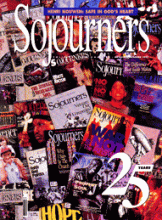Most of us have on our shelves a novel that, more than any other book, speaks to the spiritual crisis facing America. At more than a thousand pages, it offers insights into addiction, the loss of innocence, and the nature of faith that are more profound than a month of editorials.
It is also a fantasy that's 40 years old. I'm referring to The Lord of the Rings, the trilogy by J.R.R. Tolkien, which this year celebrates its 40th anniversary since first publication in America. After rereading the trilogy on its birthday, I found myself hard pressed to find a more socially relevant work of literature.
For the uninitiated, The Lord of the Rings is the story of a magic ring that allows its wearer to disappear. The ring comes into the possession of Frodo Baggins, a small creature called a hobbit. Frodo discovers that the ring is the creation of Sauron, the evil Dark Lord. Over time the ring warps the mind and spirit of its user, transforming him into a craven, egomaniacal whelp. It can only be destroyed by dropping it into the fires of Mount Doom, which is in the heart of Mordor-the "Land of Shadow" where Sauron dwells. As Frodo plods toward Mount Doom, he becomes weaker with every step, the ring weighing him down and poisoning his soul.
As Tolkien fans will note, no doubt with irritation, this is a facile summary of a work of breathtaking complexity-like describing The Iliad as a book about a fight over a girl. Tolkien's world of Middle Earth, with its hobbits, elves, dwarves, and wizards, is as palatable as James Joyce's Dublin or Anne Tyler's Baltimore; the characters as believable as any in Tolstoy. It's also a deadly serious work, as Paul Kocher observed in his book Master of Middle Earth: "The Lord of the Rings stretches the imagination with its account of a world in peril....[It] does on occasion evoke smiles, but most of the time the issues go too deep for laughter."
Read the Full Article
